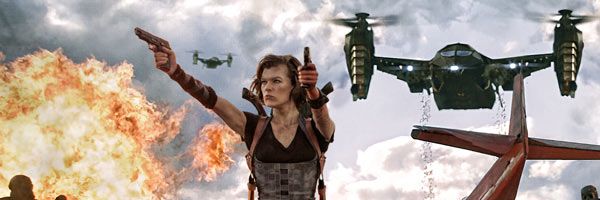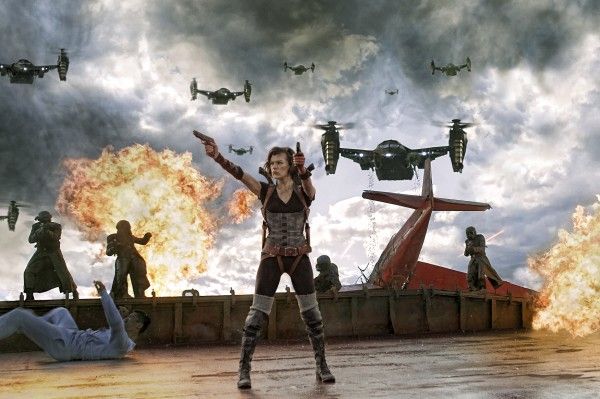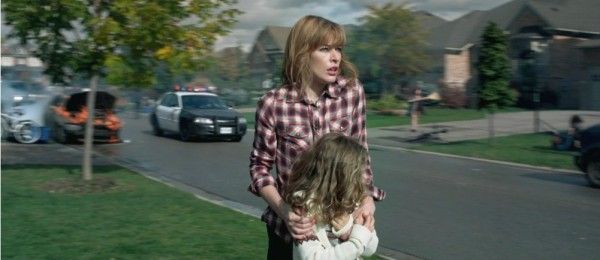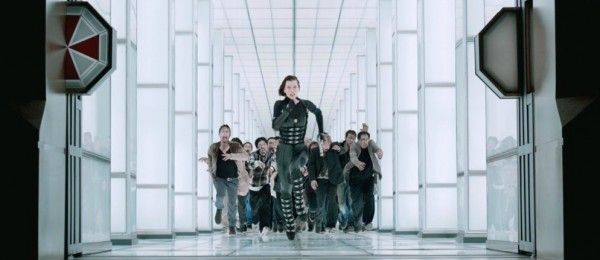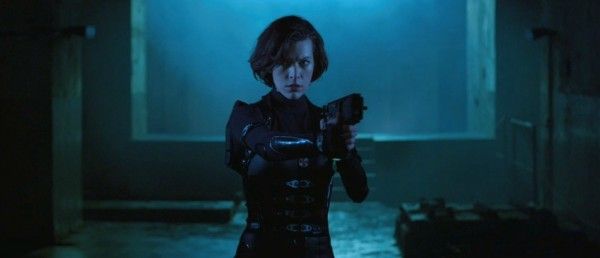Resident Evil: Retribution, from writer/director Paul W.S. Anderson, is the fifth installment of the wildly successful film franchise adaptation of the popular video game series, due out in theaters on September 14th. This time around, Alice (Milla Jovovich) awakens in the heart of the Umbrella Corporation’s most clandestine operations facility and continues to hunt those responsible for the deadly T-virus outbreak, with the help of both newfound allies and familiar friends. The film also stars Michelle Rodriguez, Sienna Guillory, Kevin Durand, Johann Urb and Boris Kodjoe.
Prior to their panel presentation at WonderCon 2012, actress Milla Jovovich and filmmaker Paul W.S. Anderson spoke to the press about the development of this installment, how personal this franchise is for both of them, their passion for the video game, and what the scriptwriting process is like. Check out what they had to say after the jump.
And click here if you missed Dave's recap of the Resident Evil WonderCon panel.
Collider: At what point did you start thinking about this film?
Milla Jovovich: What is so amazing about Paul and the way that he works, and the way the Resident Evil franchise has grown, is the fact that it’s not a machine-turned-out franchise. We don’t have a movie coming out every year because we need to fill that slot. It could be every two years. It could be every three years. It’s all about Paul’s imagination and what sparks it, whether it’s CapCom calling and saying, “We have this new monster,’ or a dream, or seeing something on the news. Whatever inspires him, he’s like, “I’ve got this idea,†and two weeks later, there’s the first draft of the script. There’s always this honesty and this organic feeling about the way he writes, and the way these movies come out, that is never scheduled or timed. It’s always, when the inspiration comes, he takes advantage of it and writes it. I think what keeps it fresh is that it’s always fresh for Paul. It’s not like a, “Okay, I have to write another one,†head-in-the porridge kind of feeling.
Paul W.S. Anderson: There is always an excitement about making these movies.
After so many films in the series, has this become more than just a franchise that you go and direct?
Jovovich: It’s been that way, from the first movie.
Anderson: Yeah, that’s how it was on the first film. Milla came to make the movie because she played the game and loved the game, and it was the same for me.
Jovovich: And Michelle Rodriguez.
Anderson: Everyone was passionate about the subject matter. For me, I was passionate about re-energizing the genre that existed when I was a kid. No one had seen an undead movie for 15 or 20 years. There was a great deal of passion and energy that went into the first film, and that’s always continued. I think that’s one of the strengths of the franchise. That’s why the franchise continues to grow. It’s very rare, in a movie franchise, where you have the same creative team behind the camera and in front of the camera, pretty much for the entire growth of the franchise. It’s really in passionate hands.
Jovovich: What makes these movies wonderful is the fact that the Resident Evil universe is amazing. From when I started playing these games with my little brother, when he was 13 and I was 22 or 23, there was that feeling of, “I love this world and it’s really freaky. As soon as the sun goes down, suddenly you get a little nervous.†It was always such a well-beloved, but not the most well-known, game. I know Michelle [Rodriguez] and I got attracted to it because it was the cool underground game. Suddenly, it was this little Europe action-horror flick. Everybody came into it, not asking for paychecks or dressing rooms, but for the love of the game.
Anderson: I refer to the franchise and the first movie as “the little movie that could.†When we made it, we shot it almost entirely in Berlin. While we were shooting, we didn’t even have American distribution for the film. It was the movie that nobody wanted. I’m very proud of the fact that we’ve turned that into a billion dollar franchise. I think maybe it was the movie that people didn’t know that they wanted, but we were making it with such energy and passion that when they saw it, they were like, “That’s pretty cool.†I think it was a really cool game, and I think the movies always had this really cool attitude about them.
Jovovich: The thing that’s wonderful is that, even when I was playing Resident Evil with my brother, it was still underground. With the movies now taking on a life of their own, it’s actually invited so many people that are non-gamers into the Resident Evil universe, which is great for us because I feel like we really helped the game become much more of a global game. People that never knew about it, now know about it. It’s fun to introduce people to something that you had a passion for, when you were younger. Now, another 17-year-old can play with her sibling. It’s fun to re-introduce this to people.
In playing the role, have you made choices, as an actress, that have become incorporated into the canon of Resident Evil, as that universe keeps growing outside of the movies?
Jovovich: No, Paul has had more of that. They use his set pieces. They used the glass corridor. They used the desert that we did in number three, for the next game. For some reason, they don’t want to put Alice in the game.
Anderson: There is a character, in the last game, who’s dressed identical to how Milla was in Afterlife. The costume is exactly the same, with the shorts and the corset.
How closely do you work together, when writing the scripts? Milla, do you have any input on the scripts and the fate of your character?
Jovovich: Paul is the man who writes the scripts. I’m just the person who reads them.
Anderson: She’ll say, “This isn’t good enough.â€
Jovovich: I’ll say, “I really like it, but I wish something would happen that’s really awesome.†He’s like, “Note taken. Something should happen here, and it should be really awesome.â€
Anderson: But, that’s a great note. It’s like, “I don’t know what’s missing, but it should be awesome.†And I’m like, “Okay, I’ll go and write something awesome then!â€
Click here for all our WonderCon coverage.

